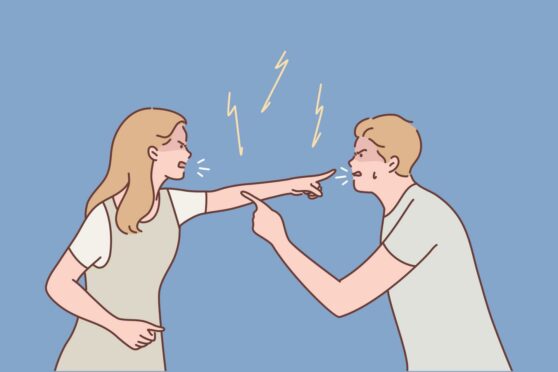Every family has disagreements.
But if they turn into full-blown arguments this can cause long-lasting damage to relationships.
Whether it’s falling out over money, the care of elderly relatives or the behaviour of children it can be an awkward experience for everyone involved.
Westhill counsellor Mark Hepburn explains that disagreements between relatives often come to a head because people have different rules, values and beliefs.
And this leads to them having different expectations.
Conflict at family events
Speaking to us as part of our Mental Health Toolkit series, Mark says arguments often crop up at family events because they’re an opportunity for people to bring up disputes.
And this can be exacerbated when alcohol is consumed with tongues becoming looser.
But if one of your relatives gets annoyed, and you can sense a disagreement brewing between you, there are ways you can help defuse the situation.
Try not to antagonise the other person
Mark, who specialises in family conflict, often helps clients whose relationships with their relatives are at breaking point.
“One of the things we always recommend when we’re working with people in conflict is that they use what’s called ‘I statements’.
“As soon as you start using sentences with the word ‘you’ in them you immediately set the other person up on the defensive.
“Phrases such as ‘you should’ or ‘you didn’t’ can come up.
“Whereas if you’re saying ‘I felt’ or ‘I was’ instead it’s less antagonistic. It’s very hard to argue with someone if they tell you they felt anxious, or put down, or unheard.”
The word ‘you’ can often be interpreted by other people as verbal finger-pointing.
Making a conscious effort to avoid using this word can make a big difference.
Why am I saying this?
Thinking about what you’re about to say can also help stop discussions becoming heated.
Mark often recommends clients think of the acronym WAIT – Why Am I saying This? – when they get into a disagreement.
“People can be desperate to jump in and say something, but thinking of this acronym can be a good way of slowing people down and can make a difference,” he said.
Family arguments: The many reasons why relatives fall out
Families go through lots of changes so it’s inevitable that family arguments will crop up.
Parents can disagree with their child’s choice of partner or could be annoyed about how their grandchildren are allowed to behave.
Or people can feel aggrieved after finding out they’ve been gossiped about at family events.
But rows can also escalate over smaller things such as table manners, or people using their mobile phones too much.
And it can build up leaving us feeling stressed.
‘We’ve lost the ability to disagree agreeably’
Mark believes many people have lost the ability to disagree agreeably and says it can be helpful to consider the other person’s point of view.
Realising that both of our points are valid can help calm the situation down before it becomes heated.
“Sometimes we have to live and let live, we have to agree to disagree,” he says.
And the biggest cause of family arguments is…
A lack of communication.
“The biggest single thing in disputes is the fact that people don’t communicate properly,” Mark says.
“They make assumptions about what people are thinking or feeling without asking them.
“Therefore there’s a loss in perspective.”
Communication is essential between both parties to avoid a heated argument.
And it needs to be clear so that there’s no room for misinterpretation.
Mark adds: “If people want to know what the other person is thinking they should just ask.”
Mark Hepburn is a counsellor and psychotherapist who works at Granite Occupational Health in Westhill, Aberdeenshire.













